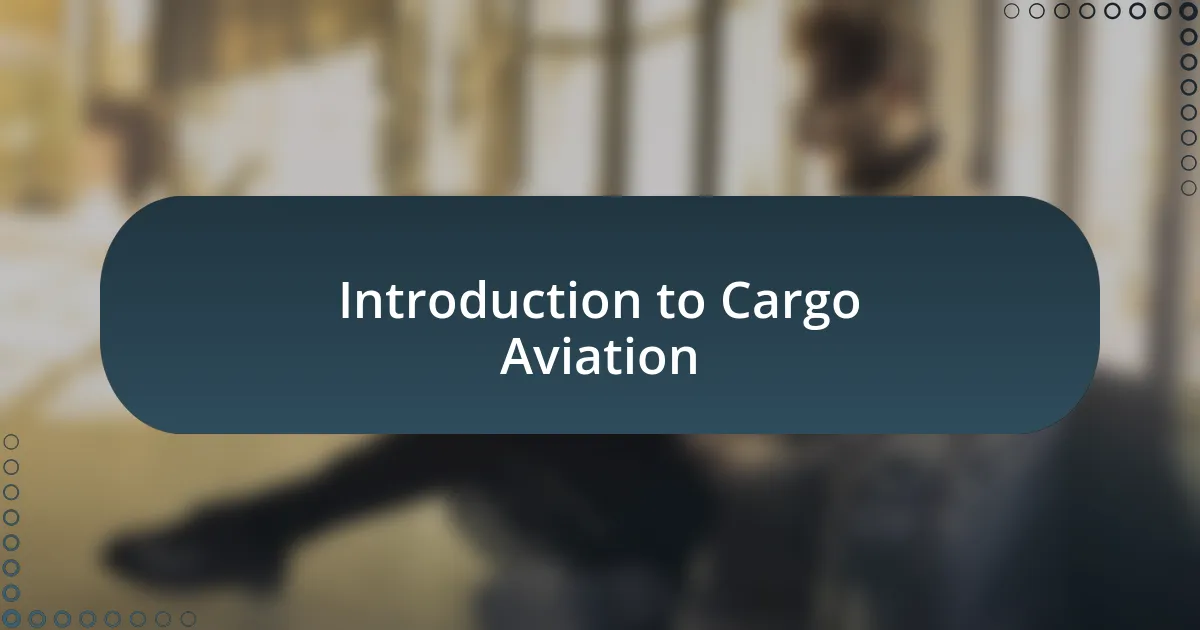Key takeaways:
- Cargo aviation is vital for global trade, delivering essential goods and connecting communities.
- Key skills for cargo pilots include attention to detail, navigation proficiency, and effective communication.
- Safety practices, such as load distribution and pre-flight inspections, are critical to prevent accidents in cargo transport.
- Future trends include automation, sustainability initiatives, and the impact of e-commerce on operational demands.

Introduction to Cargo Aviation
Cargo aviation is a fascinating field that plays a crucial role in global trade and logistics. When I first learned about how cargo planes transport essential goods across vast distances, I was struck by the sheer efficiency of it all—can you imagine how many lives depend on timely deliveries? From perishable food items to vital medical supplies, cargo aviation is the backbone of many industries.
During my time in this sector, I witnessed firsthand the incredible coordination required to get a single flight off the ground. There’s a unique rhythm to the operations, which I found both exhilarating and sometimes overwhelming. Have you ever thought about the meticulous planning that goes into each route and each load? It’s like orchestrating a complex symphony where every member plays a critical role.
As I delved deeper into cargo aviation, I discovered that it’s not just about moving goods; it’s about connecting communities and economies. I recall an instance when a last-minute shipment of life-saving drugs reached a remote area just in time to save lives. Moments like these remind me of the profound impact that cargo aviation has—not only for businesses but for people everywhere. It’s more than just flying; it’s about making a difference, and that feeling is truly inspiring.

Understanding Cargo Plane Operations
Understanding cargo plane operations requires a grasp of the logistics involved. Each flight is meticulously planned, with factors like weight distribution, fuel efficiency, and regulations at the forefront of decision-making. I vividly remember attending a briefing where a seasoned pilot emphasized the importance of optimizing cargo weight; a well-balanced load can significantly impact flight performance and safety.
Another fascinating aspect is the technology that underpins cargo operations, such as routing software and inventory management systems. During my experience, I saw how these tools transformed our ability to adapt quickly to unexpected challenges. One time, due to a sudden weather shift, we had to reroute an entire fleet load, and the software seamlessly enabled us to pivot in real time while ensuring that critical items still reached their destinations.
Furthermore, understanding cargo plane operations extends beyond the aircraft itself to include the teams that work behind the scenes. It takes a passionate group of individuals, from ground crew to air traffic controllers, to make sure everything runs smoothly. Reflecting on my time in a busy cargo hub, I was constantly reminded of the teamwork required; one person’s meticulous attention to detail could save hours in transit time. How can we underestimate the value of that commitment when lives are literally on the line?
| Aspect | Details |
|---|---|
| Load Planning | Involves calculating weight distribution and ensuring safety and efficiency. |
| Technology Use | Includes routing software and inventory management systems for real-time adjustments. |
| Team Coordination | Requires collaboration among various personnel to ensure smooth operations. |

Key Skills for Cargo Pilots
Cargo pilots must possess a unique blend of skills that cater to the demands of their specific role. Through my journey in aviation, I’ve learned that strong problem-solving abilities are crucial. One night, during an overnight flight, I faced unexpected cargo weight discrepancies right before takeoff. Staying calm, I quickly assessed the situation, identified potential solutions, and ultimately adjusted the load, which allowed us to proceed safely and on time.
Here are some key skills I consider essential for successful cargo pilots:
– Attention to Detail: Understanding payload specifications and ensuring compliance with regulations.
– Navigation Proficiency: Mastery of navigation tools and techniques to ensure safe, efficient routes.
– Communication Skills: Ability to coordinate effectively with ground teams and air traffic control.
– Flexibility and Adaptability: Quick thinking and the capability to adapt to changing situations, such as weather or cargo issues.
– Technical Knowledge: Familiarity with aircraft systems and cargo handling equipment to troubleshoot problems on the spot.
– Time Management: Prioritizing tasks and managing schedules to ensure timely deliveries.

Challenges in Cargo Flight
Cargo flight presents its own set of unique challenges that can test even the most seasoned pilots. For instance, I recall a particularly intense scenario when we experienced sudden turbulence while transporting delicate cargo. It was nerve-wracking watching as the indicators fluctuated wildly, highlighting the importance of stabilizing the load. This incident made me realize just how critical it is to secure cargo properly to prevent damage during transit.
Another challenge is managing unexpected weather changes. I remember a flight where I was confronted with an unexpected storm just after takeoff. The visibility dropped significantly, and I had to make swift decisions about rerouting while keeping our arrival schedule in mind. Such experiences taught me the vital importance of staying updated on weather conditions and having contingency plans in place.
Communication can also be an obstacle in cargo operations. On one occasion, I found myself in a situation where the ground crew miscommunicated package details, leading to potential delays. I quickly understood how essential clear, effective communication is to avoid misunderstandings that can disrupt the entire supply chain. Have you ever considered how much coordination happens behind the scenes to keep cargo flights on schedule? It’s a complex web that, when managed well, allows for a seamless operation, but when mismanaged, it can lead to significant challenges.

Safety Practices in Cargo Transport
Safety is paramount in cargo transport, and my time in the cockpit has made that crystal clear. I vividly remember a flight when a last-minute safety briefing addressed the importance of load distribution. Our team worked tirelessly to redistribute cargo after realizing the weight was unevenly placed. That experience reinforced how essential it is for all crew members to be vigilant about adhering to safety protocols—after all, even minor lapses can have significant consequences.
One practice that stands out is the thorough pre-flight inspection. There’s something so grounding about walking around the plane, inspecting every inch, and ensuring all systems are operational before takeoff. It reminds me of a specific occasion when we discovered a minor issue with the cargo door latch. Addressing it before we hit the runway not only prevented a potential disaster but also reinforced the idea that being proactive about safety checks pays off immensely.
I often wonder how cargo operations maintain such high safety standards under pressure. In my experience, one way this is achieved is through continuous training. I participated in simulation drills that felt intense but highlighted the need for preparedness in emergencies. This hands-on approach not only improved my confidence but also ingrained a safety-first mindset that I carry with me to this day. Have you ever experienced the type of training that left you more assured in your abilities? It’s that level of commitment to safety that makes all the difference.

Lessons from Real-World Experiences
During my time flying cargo planes, I learned that flexibility is crucial. There was a day when an unexpected storm forced us to change our flight path. The quick adaptation required from everyone onboard highlighted how dynamically we need to respond to changing circumstances. Have you ever had to pivot quickly in a situation? I found that embracing change not only improved our operational efficiency but also reinforced the value of teamwork under pressure.
Another striking lesson I learned was the significance of communication. I recall a moment when miscommunication almost led to a misalignment in our landing gear checks. That experience reminded me how vital it is for every crew member to share information effectively. It’s fascinating to see how a simple message, when clearly articulated, can prevent misunderstandings and ensure smooth operational flow. Have you ever experienced a miscommunication that had lasting effects? I certainly have, and it opened my eyes to the importance of clarity in high-stakes environments.
Lastly, I discovered that a strong sense of ownership transforms the workplace. During a particularly demanding shipment, I took the initiative to oversee the loading process. Leading by example not only boosted my confidence but also inspired my team to take pride in their responsibilities. I felt a profound sense of accomplishment watching everyone step up. Doesn’t it feel rewarding to know you made a difference? That day made me appreciate how individual commitment fosters a culture of excellence within a team.

Future Trends in Cargo Aviation
One emerging trend in cargo aviation is the increasing reliance on automation and artificial intelligence (AI). I recall when we first introduced automated systems for tracking shipments; it felt revolutionary at the time. I often wondered, how much more efficient could we be with AI continually analyzing operations? The integration of these technologies not only streamlines processes but also enhances accuracy, which is essential in an industry where timing can make or break a business deal.
Sustainability is another significant shift on the horizon. I remember a conversation with a fellow pilot about the environmental impact of our operations. It struck me how urgently we need cleaner alternatives. The focus on electric or hybrid cargo planes represents a pivotal change that responds not only to regulatory pressures but also to market demands. Wouldn’t it be incredible to reduce carbon footprints while maintaining efficiency? This evolution could redefine our approach to logistics and contribute to a more sustainable future for the aviation industry.
Lastly, the expansion of e-commerce is reshaping cargo aviation as we know it. During the pandemic, I witnessed a surge in demand for rapid deliveries that challenged our operational capabilities. Have you noticed how quickly parcels arrive at your doorstep nowadays? This growing expectation for speed forces airlines to innovate, adopting smaller aircraft for regional hubs to ensure that goods reach customers in record time. It’s fascinating to see how our industry adapts to meet these new consumer behaviors, propelling it into a future driven by immediacy and convenience.











